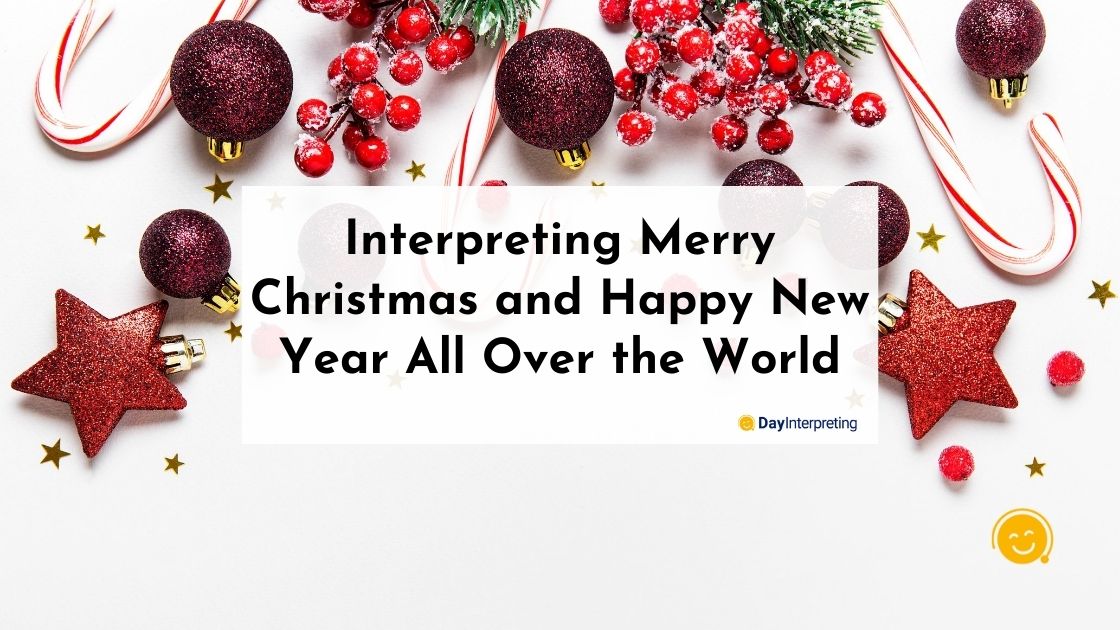As we approach the ending of another year and anticipate the start of the coming year, our Day Interpreting blog can’t help but explore the many different ways Merry Christmas and Happy New Year is said and interpreted from country to country and within the different cultures and different languages during the festive season.
Of course, we’ll start with the basics and look at the different English variations for these two festive wishes and then we take it from there. So without further ado, let’s dive right in.
Merry Christmas – English Variations
It’s important to keep in mind that due to religious and other more sophisticated reasons, some English speakers do not use the term ‘Merry Christmas’. let’s dig a little deeper to find out why this is so.
Since 1954, the term Merry Christmas has been in use. Of course, much thanks goes to the Christmas carol ‘We wish you a Merry Christmas’. But, it was traditionally considered, especially in England, that ‘merry’ had a raucous feel to it and as such ‘Happy Christmas’ became another way for everyone to bring Christmas greetings. The royal family set the trend by using ‘Happy Christmas’. It was seen as taking on a more sophisticated connotation as opposed to Merry Christmas. Others began to follow this trend and to this day, Queen Elizabeth wishes everyone a ‘Happy Christmas’ instead of a ‘Merry’ one.
Additionally, there are some religions as well as Christian denominations that neither celebrate nor wish people a Merry Christmas. Instead, many prefer to say ‘Happy Holidays’. It is believed that Happy Holidays is a more inclusive form of greeting and wishing people well during the season as opposed to Merry Christmas.
Other variations of Christmas greetings in English are as follows:
- Christmas Wishes
- Christmas Greetings
- Season’s Greetings
Interpreting Merry Christmas into other languages
There are many parts of the world, especially in the Eastern Hemisphere, that do not celebrate or recognize Christmas as holiday. However, this does not stop many from bringing Christmas greetings and doing something to commemorate the season. Countries such as China and Japan are prime examples. But, we can still interpret their Christmas wishes, so here goes:
China
- Mandarin – Shèngdàn jié kuàilè
- Cantonese – Seng Dan fai lok
Japan
- Japanese – Meri Kurismasu
Of course, these phrases cannot be translated word for word from the English language, but when spoken in these languis inteages, they are interpreted to mean exactly Merry Christmas or Happy Holidays.
France
In France, Christmas is indeed a time that everyone looks forward to and they have major celebrations to commemorate this wonderful time of year that many look forward to. Similar to the English language, there are a few variations in the French language for wishing someone well for the Christmas season.
The most popular form is ‘Joyeux Noël’ which literally is interpreted in English to mean merry, joyful, or happy Christmas in English. ‘Joyeuses fetes’ is translated and interpreted in English to mean Happy Holidays and giving someone Season’s Greetings in French is ‘ Meilleurs voeux’ .
Merry Christmas in Spanish
Merry Christmas in Spanish is quite a popular phrase that is broadly known right around the world. You might have heard it too; ‘Feliz Navidad’. Of course, when interpreted it means either Happy Christmas or Merry Christmas.
To say Happy Holidays in Spanish would be ‘Felices Vacaciones’ and to say Season’s Greetings it’s ‘Felices Fiestas’.
In Spain, a widely used phrase is ‘Felices Pascuas de Navidad’. If we interpret this in English, it means ‘Happy Christmas Holidays’. A phrase we don’t use much in English but a phrase for wishing people well at Christmas time.
Merry Christmas in Portuguese
Portuguese and Spanish are similar languages. Of course, this means that to say Merry Christmas in Portuguese is ‘Feliz Natal’. You can also say ‘ Boas Festas’ which is interpreted to mean Happy Holidays in English.
Merry Christmas interpreted in other different languages
In German, Merry Christmas and Happy Holidays are as follows:
- Merry Christmas -‘Froche Weinachten’
- Happy Holidays – ‘Froches Fest’
In Italian, Merry Christmas is ‘Boun Natale’, when interpreted to English it literally means ‘good Christmas ‘. If we should take the interpretation of ‘Boun Natale’ a little further, we’ll see that its origins step from the Latin word birth. So when an Italian wishes you ‘Boun Natale’, they are wishing you ‘a good birth’.
The Dutch say ‘Vrolijk kerstfeest’ which when interpreted to English means Cheerful Christmas. To say Happy Christmas or Merry Christmas in Dutch would be ‘ Zalig Kerstfeest’ or ‘Zalig Kerstmis’ and Happy Holidays is ‘Fijne Vakantie’.
Interpreting Happy New Year from other languages
The holiday season cannot be complete without sending best wishes to friends and family for the new year and having celebrations on new year’s eve. With this in mind, we’ll now explore how Happy New Year is expressed and interpreted in languages other than English.
Similar to celebrating Christmas, not everyone in the world celebrates the new year during the holiday season. However, it isn’t lost on them that the Gregorian calendar is used widely across the world and as such the tradition of celebrating on New Year’s Eve to ring in the new year is a worldwide tradition.
And so with that said, keep reading to find out how to say Happy New Year in a few other languages and how it’s interpreted in English.
Spanish:
‘Feliz Año Nuevo’ means Happy New Year in Spanish. Of course, the interpretation is literal in English and ringing in the new year in Spain for example comes with a very fun and unique tradition. New Year’s eve in Spanish is ‘Vispera de Ano Nuevo’ and a fun tradition is eating 12 grapes within the last 12 seconds of the old year. If you eat all of them in time then your new year will be filled with good luck and prosperity.
French:
In French, Happy New Year is ‘Bonne Année’. It is interpreted in English to mean ‘Good Year’. New Year’s Eve in French is ‘Reveillon de Nouvel an’. It is also called ‘La Saint-Sylvestre’ because in France, December 31 is celebrated as Saint’s Feast Day.
Italian:
Italian for Happy New Year is ‘Felice Anno Nuovo’. In Italy, the holiday season is a festive time spent with friends and family. New Year’s Eve, similar to France is known as ‘La Festa di San Silvestro’ and is also celebrated as Saint Sylvester’s Feast Day. ‘Capodanno’ is interpreted to mean New Year’s Day in English.
German:
‘Gutes Neues Jahr’, when interpreted to English literally means ‘Good New Year’. Within Germany and the German language, there are a few ways in which one can offer their best wishes to you for the new year. Here are some other variations:
‘Gesundes Neues Jahr’ – When translated to English, it is interpreted to mean ‘Healthy New Year’.
‘Prosit Neujahr’ – In recent times, Germans have taken on a liking to this phrase and many prefer to use it instead of the standard German way of saying Happy New Year. ‘Prosit’ is German for ‘cheers’. ‘Neujahr’ is what would be considered to be a compound word in German that means ‘new year’. We can safely say that ‘Prosit Neujahr’ means ‘Cheers to the new year’.
‘Frohes Neues Jahr’ – Another variation for wishing someone a Happy New Year in German and this time around it is the literal translation and interpretation to English.
Dutch:
The Dutch say ‘Gelukkig nieuwjaar’ which is directly interpreted to mean Happy New Year in English. ‘Oudejaarsavond’ is Dutch for New Year’s Eve. Of course on this day there are festivities that help everyone say goodbye to the old year and welcome the new one. ‘Nieuwjaarsdag’ is Dutch for New Year’s Day.
Similar to other parts of the world, the Duct enjoy parties, champagne and fireworks as part of their new year’s eve/new year celebrations.
Let’s wrap up
We sure did go round about the world this time around. From exploring the many different ways to say Merry Christmas in different languages to learn how to say Happy New Year as well as learning about the different interpretations they have when translated to English and their literal meaning.
No matter where you are in the world or how you say it, Merry Christmas and Happy New Year are phrases that when expressed anywhere in the world and in any language, there is a universal meaning of well wishes for friends and family that is attached to it.
And, how could we write about this without us here at Day Interpreting wishing you all the very best for the season and hoping that with this new year approaching, that all your desires and dreams will come true.
Of course, don’t forget to download the Day Interpreting app; That way you’ll be able to wish all your friends and family from anywhere in the world a Happy, Merry or Cheerful Christmas in any language as well as all the very best for the new year that is approaching.





0 Comments